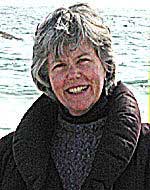|
Buddhist
Woman Awaits Prison for Protest
By
Peggy Aulisio
paulisio@eastbaynewspapers.com
 |
|
Katherine
Brown
|
|
LITTLE COMPTON —
As she walked along the beach at Westport Harbor on Wednesday,
March 26, Katherine Brown picked up a few balloons from among
the beach flotsam. She’d heard they are dangerous to wildlife.
The outing provided
one more breath of fresh sea air for Ms. Brown as she prepares
for her April 8 journey to a much different place — behind the
bars of a federal prison.
The 52-year-old Little
Compton resident is due for a three-month stay at federal prison
in Danbury, Conn., for a Class B misdemeanor. She was arrested
for trespassing at the Ft. Benning U.S. Army base, in Columbus,
Ga., on Nov. 17, 2002.
Ms. Brown, who lives
on Rock Bridge Road by Quicksand Pond, was among some 10,000
people who attended the protest against the School of the Americas.
She said she protested the American-financed program because
it trains "terrorists" -- or soldiers as the U.S.
military identifies them -- to fight in South America. She was
one of 86 people arrested because they crossed over a line onto
the military base.
Asked how she feels
about going to prison, Ms. Brown said her mind and emotions have
run through a full spectrum. She used the words frightened, privileged,
anxious, interested and curious.
"I travel through
just about the full range in 10 minutes," she said.
A student of Zen
Buddhism, she added, "As a Buddhist practitioner, that’s
one of the delightful things about the mind. It doesn’t stand
still. Sometimes I’m frightened even though there’s nothing
to be frightened about. A lot of things I’m reacting to haven’t
happened yet."
At least she’ll be
in good company. Three other protesters are also being sent
to the federal prison in Danbury -- a Catholic nun and Lutheran
lay minister, both from Wisconsin, and a youth worker in pastoral
care from outside Boston.
Ms. Brown said there
is legislation currently before the U.S. Congress to close the
school or transfer its curriculum "so it is a school of
peace and not torture and counterinsurgency." The bill
in the House of Representatives is HR1258, sponsored by Rep.
Jim McGovern of Massachusetts.
In the meantime,
however, the School of the Americas operates legally, and trespassing
there is a crime.
"They train
terrorists in military skills to help further U.S. interests,"
Ms. Brown said. "I don’t consider the interests actually
being served to be mine."
Ms. Brown is a former
professor at Creighton University in Nebraska, where she taught
health policy and ethics. After leaving she studied Buddhism
at Spirit Rock in Woodacre, California. She is currently living
in a Little Compton summer house owned by her family while waiting
to go to prison.
After years of teaching,
Ms. Brown said she left because, "I wanted to become more
engaged in social justice in the streets."
The protesters were
from all walks of life and ages and included faith-based groups
from a wide spectrum of churches, including Presbyterians, Catholics
and Quakers. Ms. Brown called them "long-time proponents
of non-violence."
She recalled feeling
that, "I was in the company of these really bold, glorious
people."
The protest group
was given a permit for a "memorial service" during
which they sang and chanted the names of people who had died
under repressive regimes in South America. Among the incidents
that inspired the protest were the deaths of Jesuit priests
in El Salvador.
"As each name
was said, the marchers moved toward the gates," she said.
Ms. Brown said the
protesters chanted "presente" as they spoke the names
and moved as if in a funeral march.
Ms. Brown said she
did not expect to be arrested and would not have been if she
had stayed on the allowed side of the line.
But then she found
herself standing by the entrance where those "who were
bold enough" did cross onto the base property where they
were not allowed. Because of the heightened sense of national
security following 9-11, Ms. Brown said the base was particularly
conscious of security.
"I was deciding.
There was a gap in the fence," she said. "There was
a young boy there who had talked the night before about his
father being taken by the military from his home."
Ms. Brown said he
was "crying and smiling and looked at me." She recalled
that it was "like a Buddha saying, ‘Okay, you can do this,
do this for everyone.’" So she did, Ms. Brown said, and
she doesn’t seem to regret it.
|